People smoking weed have more false memories: Research
By Aiswarya Sriram
Hyderabad: As there is a wide-raging debate around the world on legalising cannabis, a research led by Lilian Kloft, a faculty member of psychology and neuroscience in Maastricht University, Netherlands, has found evidence that highly-intoxicated people are more likely to formulate false memories.
The researches selected 64 participants (32 male and 32 female) to check the effect of cannabis on people’s memories. The participants were divided into two groups. One group was given tetrahydrocannabinol (TCH) activated weed (highly intoxicating), while the other group was given a placebo (prescribed amount of drug for psychological benefit).
The group was put through different tests. The research states that the study was conducted to understand the legal implications and how police should interview a stoned eye-witness. Testimony of eye-witness is highly important in any legal case, but if memory performances are imperfect such false memories can have disastrous consequences on legal cases, stated the research.
In one test, the researchers used virtual reality where participants witnessed a fight at a train station. Later, they were asked questions about the incident. There were some questions about things that did not happen in the simulation, however, participants high on TCH activated cannabis created scenes in their minds making false memories. In another test, participants were asked to remember one main word and words associated with it. Cannabis-intoxicated individuals were found to answer more unrelated words compared to participants who had taken the placebo.
Kloft, in the study, concludes, “Given the described findings of cannabis-induced memory impairment, cannabis intoxication was generally expected to result in higher false-memory rates, compared to a placebo condition.”
The participants were also tested a week later to understand the delayed effects of the drugs but it was found that there was no great difference in answers of different groups, showing that memory decays over time. The study was published in Proceedings of the National Academy of Sciences of the United States of America.